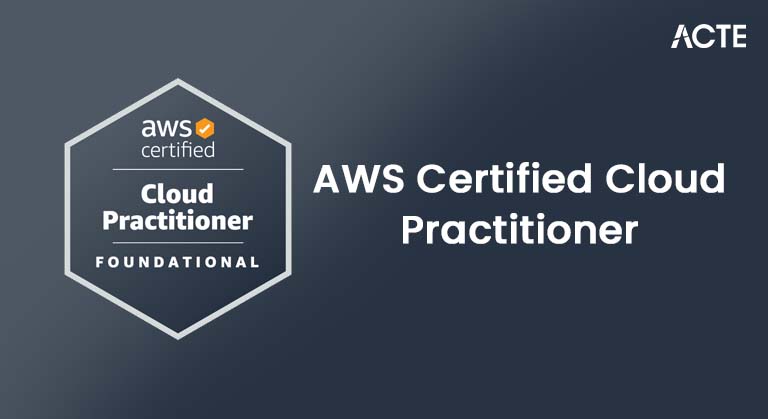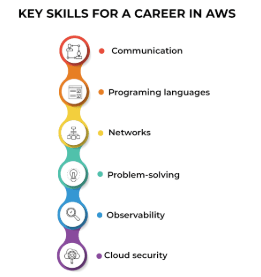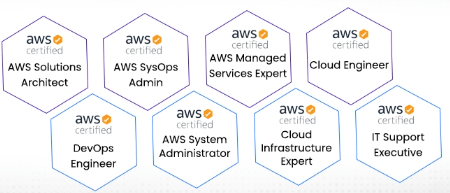
- Introduction to AWS Certified Cloud Practitioner
- Importance of AWS Certification
- Roles and Responsibilities of AWS Cloud Practitioners
- Industry Demand for AWS Practitioners
- Freelancing vs Full-Time Salary Comparison
- Job Opportunities for AWS Certified Professionals
- Salary Trends in Different Regions
- Factors Affecting AWS Practitioner Salary
- AWS Cloud Practitioner vs. Other AWS Certifications
- Skills Required for Higher Salary Packages
- Future Growth in Cloud Computing Careers
- Conclusion
Introduction to AWS Certified Cloud Practitioner
The AWS Certified Cloud Practitioner certification is designed for individuals looking to demonstrate a foundational understanding of Amazon Web Services (AWS) Cloud and its services. As Amazon Web Services Training is the leading cloud service provider, this certification serves as a stepping stone for people who wish to establish themselves in the cloud computing industry. The certification is ideal for anyone who wants to learn the basics of cloud computing and gain an understanding of AWS services and architecture. The AWS Certified Cloud Practitioner exam validates a candidate’s ability to recognize and understand AWS Cloud concepts, security, billing, pricing, and core AWS services. It is perfect for professionals new to the cloud computing industry and those looking to validate their existing knowledge and enhance their career prospects in cloud technology.
Importance of AWS Certification
Cloud computing is rapidly becoming an essential part of modern technology infrastructure, with organizations increasingly relying on cloud services like AWS to manage their data, applications, and IT operations. The AWS Certified Cloud Practitioner certification is essential because it equips individuals with a strong understanding of the fundamental AWS concepts that underpin cloud solutions. Here are some key reasons why AWS certification is highly valued:
- Industry Recognition: AWS is one of the most widely used cloud platforms, and its certification is recognized globally as a sign of proficiency and knowledge in the cloud domain. Being AWS Certified professionals gain credibility and visibility in the job market.
- Improved Career Prospects: The demand for cloud computing professionals is skyrocketing. AWS certification is a powerful way to differentiate yourself from other candidates and boost your chances of securing a job in this competitive field.
- Job Readiness: The AWS EC2 Spot Instances provides a practical understanding of cloud computing, making it easier for individuals to contribute to cloud-related projects and tasks immediately after certification. It also enhances one’s ability to understand and navigate cloud services, security, and billing.
- Career Growth and Promotion: Having AWS certification opens up opportunities for promotion within organizations and may help employees transition to cloud-related roles or higher-paying jobs.

Roles and Responsibilities of AWS Cloud Practitioners
An AWS Cloud Practitioner typically plays an introductory role in a cloud computing environment. Their primary responsibilities include:
- Understanding Cloud Concepts: They are expected to have a strong understanding of cloud computing concepts such as elasticity, scalability, security, and the economic benefits of moving to the cloud.
- Knowledge of AWS Services: They should be familiar with core AWS services like EC2, S3, RDS, VPC, and others, understanding their use cases and benefits. They are also responsible for knowing how to use AWS management tools, such as AWS Console, AWS CLI, and AWS SDKs.
- Security and Compliance: An AWS Cloud Practitioner should be familiar with AWS’s fundamental security concepts, including IAM (Identity and Access Management), encryption, and compliance frameworks.
- Cost Management: AWS Cloud Practitioners should understand how AWS pricing works, including the different pricing models and how to estimate costs for AWS services.
- Support and Troubleshooting: While they may not be responsible for direct troubleshooting, they should understand how AWS Certified professionals support works, including the different support plans and their applications.
- United States: In the U.S., AWS Cloud Practitioners can expect an average salary of around $80,000 to $100,000 annually. However, this can increase in regions with a higher cost of living, such as San Francisco or New York City.
- Europe: AWS-certified professionals can expect salaries from £40,000 to £60,000 ($55,000 – USD 75,000) annually in countries like the UK and Germany. Western Europe tends to offer higher wages compared to Eastern Europe.
- India: Top AWS Services Practitioners in India can earn around ₹ $6,00,000 to ₹ $12,00,000 ($8,000 – $16,000 USD) annually. The pay scale is relatively lower in India due to the lower cost of living, but it is still considered competitive for the tech industry in the region.
- Middle East: In countries like the UAE and Saudi Arabia, AWS certifications can yield salaries ranging from $60,000 to $90,000 annually, depending on expertise and experience.
- Australia: In Australia, AWS Cloud Practitioners can expect an average salary ranging from AUD 80,000 to AUD 120,000 ($55,000 – USD 85,000) annually, depending on location and experience.
- Location: Salaries are heavily influenced by geographical location. Areas with a higher cost of living generally offer higher salaries to compensate for the increased living expenses.
- Experience: While an AWS Certified Cloud Practitioner is an entry-level certification, the more experience you gain with AWS services and cloud computing projects, the higher the salary you can expect.
- Job Role: A certified professional’s specific role can influence their salary. For example, a Cloud Practitioner with more specialized roles, such as a Solutions Architect or AWS Training , will earn higher wages.
- Industry: The industry in which an individual works also impacts their pay. Sectors like finance, healthcare, and technology tend to offer higher salaries due to the critical need for cloud services in these industries.
- Company Size: Larger enterprises or companies in the tech industry may offer more competitive compensation packages, including bonuses and benefits.
- Certifications and Education: Additional certifications or an advanced degree in computer science or related fields can increase earning potential.
- AWS Certified Solutions Architect – Associate: AWS EC2 Cloud Computing is one of the most popular certifications intended for professionals with more experience in cloud architecture. It typically requires a deeper understanding of AWS services and the ability to design scalable and resilient architectures. The salary for this certification is generally higher than that of the Cloud Practitioner certification.
- AWS Certified Developer – Associate: This certification focuses on software developers who want to demonstrate their expertise in building applications on AWS. Developers typically have a more specialized skill set and can earn more than Cloud Practitioners.
- AWS Certified SysOps Administrator – Associate: This certification is intended for cloud infrastructure operations professionals. The salary potential for SysOps Administrators is higher, as the role often requires more advanced technical knowledge and hands-on experience.
- AWS Certified Solutions Architect—Professional: This certification is intended for advanced professionals with in-depth knowledge of AWS architecture. Due to the level of expertise required, professionals with this certification can earn significantly higher salaries.
- Advanced AWS Services: Mastery of services like AWS Lambda, EC2, S3, DynamoDB, and VPC.
- Automation and Scripting: Knowledge of infrastructure as code (IaC) tools like Terraform and AWS CloudFormation.
- Cloud Security: A strong understanding of security best practices and compliance frameworks in the cloud.
- DevOps and CI/CD: Expertise in DevOps methodologies and CI/CD tools like Jenkins, Docker, and Kubernetes.
- Big Data and Machine Learning: Familiarity with AWS analytics tools like Redshift, Athena, and SageMaker.
- Multi-Cloud Expertise: While AWS is dominant, understanding other cloud platforms like Microsoft Azure and Google Cloud can further enhance a professional’s value.
Excited to Obtaining Your AWS Certificate? View The AWS Certification Training Offered By ACTE Right Now!
Job Opportunities for AWS Certified Professionals
The demand for AWS-certified professionals continues to grow as more organizations migrate to the cloud and adopt cloud-based solutions. Common job opportunities for AWS Certified professionals. Cloud Solutions Architect: Responsible for designing cloud infrastructure solutions tailored to business needs. Cloud Engineer Manages cloud infrastructure, automation, and deployment tasks. AWS VPC (Virtual Private Cloud) Engineer Works on automating the CI/CD pipeline and improving software delivery processes. AWS Cloud Consultant Guides organizations on how to leverage AWS for optimal performance and cost savings. AWS Cloud Administrator Manages and monitors the cloud environment to ensure it runs smoothly and securely.
Salary Trends in Different Regions
Salary trends for AWS Certified Cloud Practitioners can vary depending on the region, experience, and level of expertise. However, cloud computing professionals, in general, are among the highest-paid workers in the IT sector. Here’s a look at how salaries typically differ across different regions:
Excited to Obtaining Your AWS Certificate? View The AWS Training Offered By ACTE Right Now!
Factors Affecting AWS Practitioner Salary
Several factors can influence the salary of an AWS Cloud Practitioner. These factors include:
Industry Demand for AWS Practitioners
Cloud computing is expected to continue growing, and AWS remains at the forefront of this trend. According to multiple reports and surveys, AWS skills are in high demand across industries. Cloud computing is integral to software companies, e-commerce platforms, and SaaS providers. Financial Services Many banks and financial institutions are moving to the cloud to improve efficiency and scalability. Healthcare with sensitive patient data, healthcare providers adopt AWS for secure and compliant cloud storage solutions. Retailers use AWS to support e-commerce platforms, manage supply chains, and personalize customer experiences.
Are You Considering Pursuing an AWS Master’s Degree? Enroll For AWS Master Course Today!
Freelancing vs Full-Time Salary Comparison
Freelancing and full-time employment each have advantages when it comes to salary. Freelancers can often command higher hourly or project-based rates but face instability and lack of benefits. On the other hand, full-time employees may earn a stable salary with additional benefits like AWS Management Console , retirement plans, and paid leave. Freelance AWS professionals generally earn higher hourly rates than full-time employees. However, the trade-off includes the lack of job security, benefits, and paid time off. Full-time salaries are more predictable and come with benefits that can be valuable in the long run.

AWS Cloud Practitioner vs. Other AWS Certifications
AWS offers a variety of certifications, each catering to different levels of expertise and specific cloud roles.The AWS Certified Cloud Practitioner is an introductory certification that provides foundational knowledge, while other AWS certifications offer more specialized knowledge that can lead to higher-paying roles. Here’s how the AWS Certified Cloud Practitioner compares to other AWS certifications:
Skills Required for Higher Salary Packages
To command a higher salary in the AWS domain, professionals should focus on building advanced skills such as:
Future Growth in Cloud Computing Careers
The cloud computing industry is expected to grow, driven by increased cloud adoption, digital transformation, and moving towards multi-cloud strategies. As AWS continues to innovate with new services, the demand for AWS-certified professionals will likely increase, leading to more job opportunities and potentially higher salaries for skilled individuals. Cloud computing careers, especially those focused on AWS, are expected to experience substantial growth as businesses continue to embrace cloud technologies.
Conclusion
The AWS Certified Cloud Practitioner certification is a great starting point for individuals looking to enter the AWS Training field. While it may not command the highest salaries, it provides a solid foundation that can lead to more specialized roles and higher-paying opportunities. As the demand for cloud services grows across industries, AWS-certified professionals will continue to be highly sought after, making this certification a valuable asset for anyone looking to advance their career in cloud computing.





